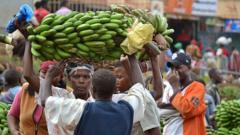In a significant escalation of ongoing trade disputes, Tanzania has announced a ban on all agricultural imports from South Africa and Malawi. This decision was publicly confirmed by Agriculture Minister Hussein Bashe, who emphasized the necessity of respecting business norms across borders. Tanzania's action stems from years of trade barriers faced by its exports, notably South Africa’s longstanding ban on the import of Tanzanian bananas and Malawi’s restrictions on flour, rice, and other agricultural products.
Tanzania Halts Agricultural Imports from South Africa and Malawi Amid Trade Disputes

Tanzania Halts Agricultural Imports from South Africa and Malawi Amid Trade Disputes
Tanzania aims to protect its economic interests with a new import ban on its neighbors, intensifying regional trade tensions.
Despite previous diplomatic engagements aimed at resolving these trade conflicts, Bashe indicated that discussions are ongoing to address the issues. The implications of Tanzania's ban will be felt in both South Africa and Malawi, significantly affecting South African fruit exports to Tanzania and forcing Malawi to seek alternative routes for its exports.
Malawi’s earlier import restrictions were labeled a temporary protective measure, aimed at bolstering local agricultural production without foreign competition. In response, Minister Bashe criticized Malawi’s policies for their negative impact on Tanzanian traders, characterizing them as "unfair and harmful."
While addressing concerns about food security, Bashe reassured the public that the ban would not jeopardize access to essential goods. "No Tanzanian will die from a lack of South African grapes or apples," he stated, asserting that the objective is to safeguard national interests.
This decision has already begun to disrupt trade dynamics among the three countries—members of the Southern African Development Community (Sadc). Reports indicate that Malawian exports have significantly increased over recent years, made possible by access to Tanzanian ports like Dar es Salaam, which are critical for transporting goods. If Malawi loses this access, shipping through alternative Mozambican ports could lead to increased costs.
Minister Bashe reiterated that the import ban is not intended to instigate a trade war, but rather to rectify the "unequal market access" faced by Tanzania and protect the livelihoods of its citizens. This move marks a notable turn in regional trade relations that will require careful navigation in the coming months.
Malawi’s earlier import restrictions were labeled a temporary protective measure, aimed at bolstering local agricultural production without foreign competition. In response, Minister Bashe criticized Malawi’s policies for their negative impact on Tanzanian traders, characterizing them as "unfair and harmful."
While addressing concerns about food security, Bashe reassured the public that the ban would not jeopardize access to essential goods. "No Tanzanian will die from a lack of South African grapes or apples," he stated, asserting that the objective is to safeguard national interests.
This decision has already begun to disrupt trade dynamics among the three countries—members of the Southern African Development Community (Sadc). Reports indicate that Malawian exports have significantly increased over recent years, made possible by access to Tanzanian ports like Dar es Salaam, which are critical for transporting goods. If Malawi loses this access, shipping through alternative Mozambican ports could lead to increased costs.
Minister Bashe reiterated that the import ban is not intended to instigate a trade war, but rather to rectify the "unequal market access" faced by Tanzania and protect the livelihoods of its citizens. This move marks a notable turn in regional trade relations that will require careful navigation in the coming months.

















